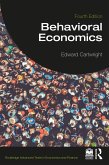Dieser Download kann aus rechtlichen Gründen nur mit Rechnungsadresse in A, B, BG, CY, CZ, D, DK, EW, E, FIN, F, GR, HR, H, IRL, I, LT, L, LR, M, NL, PL, P, R, S, SLO, SK ausgeliefert werden.
"Contemporary behavioral economics often downplays the founding work of Nobel Laureate Herbert Simon and the Carnegie School. Morris Altman shows that Simon's original behavioral economics can still offer much insight, particularly in highly complex contexts. Going beyond the focus on 'errors and biases' in much of current behavioral economics, Altman develops a rich, dynamic analysis, stressing the role of institutional and environmental factors in decision-making. This is an extremely important book." -- Geoff Hodgson, Professor in Management, Loughborough University London
"Morris Altman's understanding of behavioral economics is broad and far-reaching. In this book he has drawn on the history of economic thought, economics and ethics, and the methodology of economics to explain how behavioral economics has changed the goals and trajectory of recent economics. Especially valuable is his attention to Herbert Simon's early contribution and those of Gerd Gigerenzer and his colleagues to an ecological economics. Altman's assessment of Daniel Kahneman and Amos Tversky's influential work is perceptive and fresh. This book will be very useful to scholars and students looking for a full understanding of this important development in contemporary economic thinking, and is strongly recommended." --John Davis, Professor Emeritus of Economics, Marquette University
"Altman has written an excellent evolution of behavioral economics, and how it is similar and different from neoclassical theory. Anyone interested in behavioral economics will find this book interesting and informative." -- Roger Frantz, Professor Emeritus of Economics, San Diego State University









